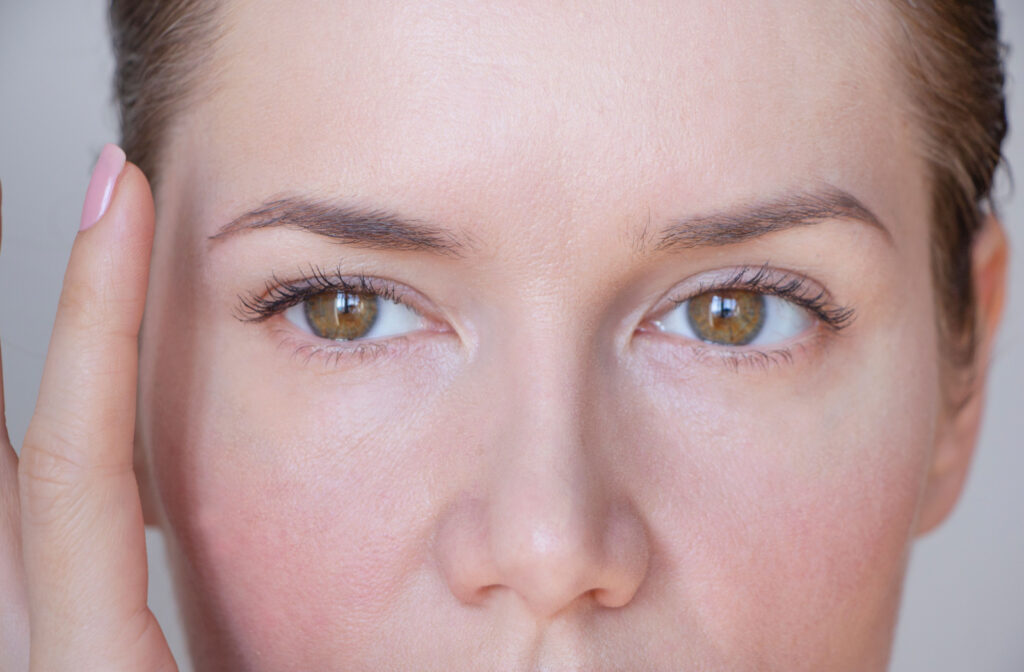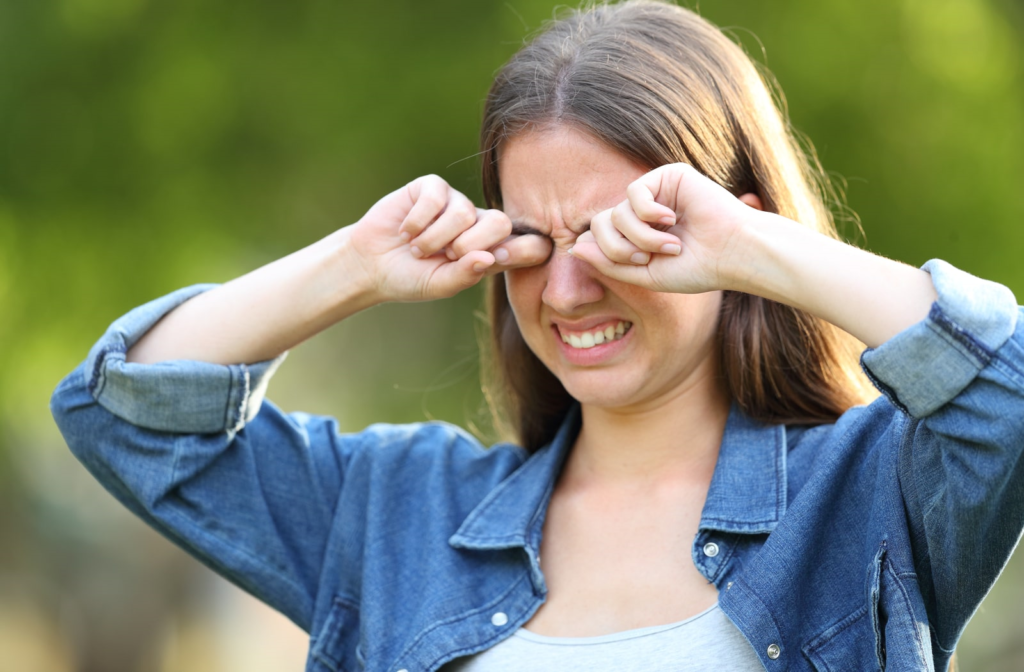Dry eyelids are a bothersome affliction where eyelids can appear red, scaly, or swollen. They may feel itchy or have a burning sensation. Dry eyelids may go hand in hand with dry eye disease.
There are plenty of reasons you may be suffering from dry eyelids. It could be due to a simple hygienic problem or could be potentially indicative of more serious eye disease.
Causes of Dry Eyelids
Environment
The environment can affect the delicate tissues that make up your eye and the surrounding area.
Humidity, or lack thereof, and fluctuations in temperature may cause dry eyelids. For example, our practice is located on the Saskatchewan prairies, which are known for cold, dry winters, and extremes in weather year-round. As you can imagine, this can affect eye health!
Wind can wreak havoc with your sensitive eyelids, too. Smoke, pollution, and UV rays also have effects on the eye. If you’re going to be exposed to harsh weather conditions, consider protection— even simple protection, like sunglasses.
Contact Dermatitis
Contact dermatitis occurs when a substance irritates your skin. Red and itchy patches may crop up on any part of the body that has come into contact with the irritant.
There are three types of contact dermatitis:
- allergic contact dermatitis (occurs when the skin reacts to an allergen)
- irritant contact dermatitis (when the skin comes into contact with a toxin)
- Photo contact dermatitis (a rare condition where active ingredients in skincare products and exposure to the sun combine to cause irritation)
As you can see, any number of substances can cause contact dermatitis, from skincare products to makeup to household cleaners to dust. Good eye hygiene is key to keeping contact dermatitis at bay.
Ageing
The skin around the eyes is more fragile and dry to begin with when compared to the skin on the rest of the body. Ageing can exacerbate skin dryness.
As we age, the amount of collagen and fat around the eyes is reduced. Less moisture in the skin overall means less moisture in eyelid skin, too.
Though it’s natural to have less moisture in the eyelids as we age, it doesn’t make it any more comfortable.

Blepharitis
Blepharitis is a condition that affects the edge of the eyelids. It can cause crustiness in the eyelashes (which may catch more particles from the environment), encourage bacterial growth, and irritate the eye.
What is Blepharitis?
Blepharitis is a condition that affects the very edge of the eyelids. It comes in two different types, anterior blepharitis, which affects the site where the eyelashes grow from the eyelid, and posterior blepharitis, which affects the area of the lid that touches the eye itself.
Anterior blepharitis can be caused by:
- Rosacea
- Allergies
- Dandruff
- Mites
- Dry Eye
Posterior blepharitis is usually caused when the oil glands in the eyelid are disrupted, a condition called Meibomian Gland Dysfunction.
Blepharitis Symptoms
The Cleaveland clinic lists several symptoms of blepharitis, including:
- Burning sensation in the eyelid area
- Excessive blinking
- Blurred vision
- Crusting of eyelashes and eyelid corners
- Dry eye
- Eyelids stuck together
- Excessive tearing
- Flakes of skin around eyes and eyelids
- Greasy eyelids
- Itching
- Photophobia (light sensitivity)
- Red, swollen eyelids
- Red, irritated eyes
If you’re experiencing chronic blepharitis symptoms, it may be time to visit an optometrist to prevent further irritation and harm to your eyes.
Eyelid Hygiene
Dry eyelid symptoms can be eased (and sometimes prevented) by using proper eye hygiene.
Some techniques to employ to ensure good eye hygiene are:
- Avoid touching your eyes (but if you need to, be sure to wash your hands with soap and water first!)
- Use fragrance-free products on your face, especially around your eyes
- Use a humidifier in your home
- Take shorter showers in cooler water
- Ensure cosmetics are replaced regularly and kept clean
- Remove any products that cause irritation from your routine
- If you can avoid wearing contact lenses and makeup (essentially, anything that goes in or around the eye) while your eyelids have a dryness flareup, do so
If you have concerns about your eyelid health and hygiene, be sure to talk to your optometric team. Their goal is to keep your eyes healthy!
Find Relief From Your Dry Eyelids
If at-home remedies and proper eye hygiene aren’t doing the trick, please visit an optometrist, who can help you ease your discomfort. There are antibiotic ointments and drops that can be prescribed, as well as steroid eye drops and oral antibiotics. One of these may provide relief for your dry eyelids.
Visit Advance Eye Care Center for a thorough eye exam and we can suggest a course of treatment that’s right for your eyes. Book an appointment in Regina today!




